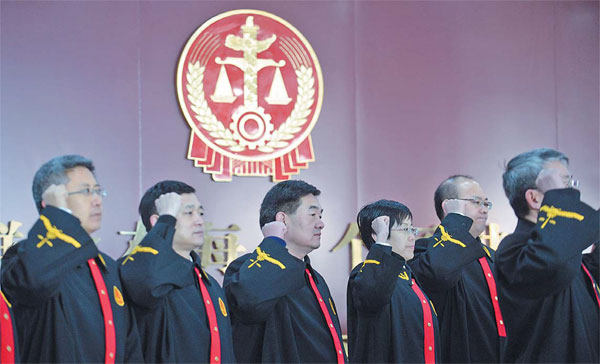
Judges from the Second Circuit Court of China's Supreme People's Court take their oaths of office. The court was established on Jan 31 in Shenyang, capital of Liaoning province.(Photo/China Daily)
Residents should find it easier to file civil cases in courts as the central government is breaking down barriers and pushing judicial reforms ahead.
Easing the filing of cases was a highlight of the 11th meeting of the central leading group for deepening overall reform on Wednesday. The group is headed by President Xi Jinping.
Under a reform proposed by the Supreme People's Court, which was approved by the group, a civil case should be filed once it is registered, rather than waiting until a preliminary review of the merits of the case has been completed.
The aim is to protect people's right to litigate by removing unnecessary procedural barriers that slow the process.
All Chinese courts must clarify the steps required to file a lawsuit, as well as build up a system of supervision, the leading group said.
Situations in which courts have refused to file lawsuits or have ignored residents' appeals must be avoided, the group said, and courts that delay filings or place other difficulties in litigants' way should be corrected.
All governmental departments in the country are asked to enhance their legal awareness, and avoid interference with the work of the courts, the group said.
At the same time, anyone who brings a frivolous lawsuit-for example, to make money from others without good cause-should be punished, it said.
At the end of February, the Supreme People's Court issued a guideline to implement the judicial reforms raised by the central government in October 2013. In the guideline, the top court said that cases should be filed after registration, rather than after reviews.
The new procedure means improved timeliness if a litigant provides complete materials and registers the information, the top court said. Courts will be required to reply to litigants within seven days about the status of their cases.
The leading group also approved some other reform plans, including one aimed at increasing salaries for teachers in rural areas-a move designed to boost teacher quality-and another aimed at public hospitals. Residents have complained about the difficulty in getting access to hospitals, as well as about the high cost of medication.
















































